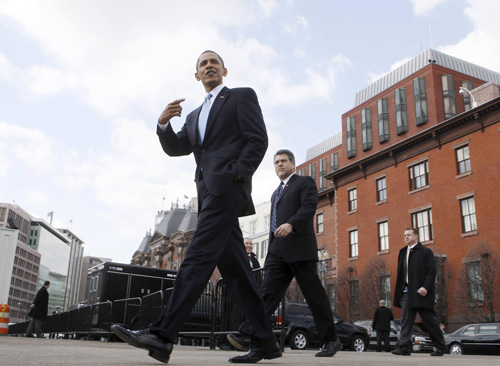Asia-Pacific
Obama, Republicans clash at heated health summit
(Agencies)
Updated: 2010-02-26 06:27
 |
Large Medium Small |
WASHINGTON: With tempers flaring, US President Barack Obama and congressional Republicans clashed in an extraordinary live-on-TV summit Thursday over the right prescription for the nation's broken health care system, talking of agreement but holding to long-entrenched positions that leave them far apart.
|
|
"We have a very difficult gap to bridge here," said Rep. Eric Cantor, the No. 2 House Republican. "We just can't afford this. That's the ultimate problem."
With Cantor sitting in front of a giant stack of nearly 2,400 pages representing the Democrats' Senate-passed bill, Obama said cost is a legitimate question, but he took Cantor and other Republicans to task for using political shorthand and props "that prevent us from having a conversation."
The more than six-hour back-and-forth was essentially a condensed, one-day version of the entire past year of debate over the nation's health care crisis, with all its heat, complexity and detail, and a crash course in the partisan divide, in which Democrats seek the kind of broad remake that has eluded leaders for half a century and Republicans favor much more modest changes. With Democrats in control of the White House and Congress, they were left with the critical decision about where to go next.
Obama and his Democratic allies argued at Thursday's meeting that a broad overhaul is imperative for the nation's future economic vitality. The president cast health care as "one of the biggest drags on our economy," tying his top domestic priority to an issue that's even more pressing to many Americans.
"This is the last chance, as far as I'm concerned," Rep. Louise Slaughter, D-N.Y.
Obama lamented partisan bickering that has resulted in a stalemate over legislation to extend coverage to more than 30 million people who are now uninsured. "Politics I think ended up trumping practical common sense," he said.
And yet, even as he pleaded for cooperation — "actually a discussion, and not just us trading talking points" — he insisted on a number of Democratic points and acknowledged agreement may not be possible. "I don't know that those gaps can be bridged," Obama said.
With hardened positions well staked out before the meeting, the president and his Democratic allies prepared to move on alone — a gamble with political risks no matter how they do that.
One option — preferred by the White House and progressives in the Democratic caucus — is to try to pass a comprehensive plan without GOP support, by using controversial Senate budget reconciliation rules that would disallow filibusters. GOP Sen. Lamar Alexander asked Democrats to swear off a jam-it-through approach, while Senate Majority Leader Harry Reid, D-Nev., defended it. Obama weighed in with gentle chiding, asking both sides to focus on substance and worry about process later — a plea he made repeatedly throughout the day with little success.
A USA Today/Gallup survey released Thursday found Americans tilt 49-42 against Democrats forging ahead by themselves without any GOP support. Opposition was even stronger to the idea of Senate Democrats using the special budget rules, with 52 percent opposed and 39 percent in favor.
A second alternative for Obama and his party is going smaller, with a modest bill that would merely smooth some of the rough edges from the current system. A month after the Massachusetts election that cost Democrats their Senate supermajority and threw the health legislation in doubt, the White House has developed its own slimmed-down health care proposal so the president will know what the impact would be if he chooses that route, according to a Democratic official familiar with the discussions. That official could not provide details, but Democrats have looked at approaches including expanding Medicaid and allowing children to stay on their parents' health plans until around age 26.
Obama himself hinted at a Democrats-only strategy. When asked by reporters as he walked to the summit site if he had a Plan B, he responded: "I've always got plans."
Many lawmakers and Obama stressed areas of agreement, including items such as allowing parents to keep young adult children on their health plans into their 20s, cutting fraud and waste and ensuring that sick people aren't dropped by insurance companies. But such items occupy the edges of reform.
Indeed, any skepticism about reaching broad consensus was vindicated as soon as the first Republican spoke — in opposition to the mammoth bills that have passed the House and Senate. Alexander, of Tennessee, said Congress and the administration should start over and take small steps, including medical malpractice reform, high-risk insurance pools, a way to allow Americans to shop out of state for lower-cost plans and an expansion of health savings accounts.
"We believe we have a better idea," Alexander said. "Our views represent the views of a great number of American people."
Disagreements were not always expressed diplomatically.
Alexander challenged Obama's claim that insurance premiums would fall under the Democratic legislation. "You're wrong," he said. Responded Obama: "I'm pretty certain I'm not wrong."
As with much in the complicated health care debate, both sides had a point. The Congressional Budget Office says average premiums for people buying insurance individually would be 10 to 13 percent higher in 2016 under the Senate legislation, as Alexander said. But the policies would cover more medical services, and around half of people could get government subsidies to defray the extra costs.
Obama and his 2008 GOP opponent for the presidency, Sen. John McCain of Arizona, had a barbed exchange. McCain complained at length about what he said was a backdoor process to produce the original bills that resulted in favors for special interests and carve-outs for certain states.
"We're not campaigning anymore. The election's over," responded a clearly irritated Obama.
"I'm reminded of that every day," McCain shot back, adding that "the American people care about what we did and how we did it."
Said Obama: "We can have a debate about process or we can have a debate about how we're actually going to help the American people at this point. And I think that's — the latter debate is the one that they care about a little bit more."
Generally, polls show Americans want solutions to the problems of high medical costs, eroding access to coverage and uneven quality. But they are split over the Democrats' sweeping legislation, with its $1 trillion, 10-year price tag and many complex provisions, including some that wouldn't take effect for eight years.
The Democratic bills would require most Americans to get health insurance, while providing subsidies for many in the form of a new tax credit. The Democrats would set up a competitive insurance market for small businesses and people buying coverage on their own. Democrats also would make a host of other changes, which include addressing a coverage gap in the Medicare prescription benefit and setting up a new long-term-care insurance program. Their plan would be paid for through a mix of Medicare cuts and tax increases.
"Not only are lawmakers polarized, the parties' constituencies are far apart," said Robert Blendon, a Harvard University professor who follows public opinion trends on health care. "The president is going to use it as a launching pad for what will be the last effort to get a big bill passed. He will say that he tried to get a bipartisan compromise and it wasn't possible."
The Blair House setting wasn't grand, or even particularly comfortable. About 40 senators, representatives and administration officials were crowded shoulder-to-shoulder around a hollow square table, perched for the six-hour marathon on wooden chairs with thin cushions. Coffee breaks were ruled out, so the only pause in the action came during lunch.
C-SPAN carried complete coverage, while news operations from cable networks to public broadcasting were making it the focus of their day.
Leaving the site during a lunch break, Obama was asked by waiting reporters if he thought the debate was engendering a lot of interest across the country.
"I don't know if it's interesting watching it on TV," he responded.











